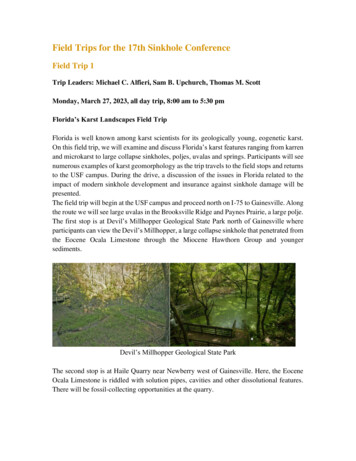
Transcription
Field Trips for the 17th Sinkhole ConferenceField Trip 1Trip Leaders: Michael C. Alfieri, Sam B. Upchurch, Thomas M. ScottMonday, March 27, 2023, all day trip, 8:00 am to 5:30 pmFlorida’s Karst Landscapes Field TripFlorida is well known among karst scientists for its geologically young, eogenetic karst.On this field trip, we will examine and discuss Florida’s karst features ranging from karrenand microkarst to large collapse sinkholes, poljes, uvalas and springs. Participants will seenumerous examples of karst geomorphology as the trip travels to the field stops and returnsto the USF campus. During the drive, a discussion of the issues in Florida related to theimpact of modern sinkhole development and insurance against sinkhole damage will bepresented.The field trip will begin at the USF campus and proceed north on I-75 to Gainesville. Alongthe route we will see large uvalas in the Brooksville Ridge and Paynes Prairie, a large polje.The first stop is at Devil’s Millhopper Geological State Park north of Gainesville whereparticipants can view the Devil’s Millhopper, a large collapse sinkhole that penetrated fromthe Eocene Ocala Limestone through the Miocene Hawthorn Group and youngersediments.Devil’s Millhopper Geological State ParkThe second stop is at Haile Quarry near Newberry west of Gainesville. Here, the EoceneOcala Limestone is riddled with solution pipes, cavities and other dissolutional features.There will be fossil-collecting opportunities at the quarry.
Haile QuarryThe third stop will be at Rainbow Springs State Park near Dunellon approximately 105miles north of the USF campus. The Rainbow Springs Group consists of numerous springsthat create the Rainbow River. Our group will visit the head spring and discuss the issuessurrounding springs in Florida, including current issues related to contamination anddeclines in discharge. These changes in water quality and discharge will be related toconditions in the springhead and sinkhole-related water sources. Along the entrance roadto the park, we will visit an abandoned hard rock phosphate mine and discuss the origin ofhard rock phosphate as a result of ancient sinkholes and swallet development.The field trip will leave the USF campus at 8:00 am and return to the campus around 5:00pm.Rainbow Springs State ParkPLEASE NOTE: Hard hats, good field boots and safety vests are required to participate inthe trip. Conference organizers cannot provide the necessary safety items.Bring rock hammers and sample collection bags as desired.
About the Trip Leaders:Michael (Mike) C. Alfieri - A professionally licensed geologist in thirteen states and anationally certified/registered hydrogeologist with twenty-five years of experience, Mr.Alfieri manages hydrogeological/water resource engineering teams in the evaluation,planning design, testing, permitting, and construction of wells for potable supply, deepinjection, and managed aquifer recharge for Water Science Associates. He is currently ViceChair of the Florida Board of Professional Geologists, a position he previously held alongwith a Chair of the Board; the Chairman of ASTM Sub-Committee D18.21.03: WellDesign, Maintenance & Construction, Voting Member of ASTM Sub-Committee D18.27:Karst, and is a member of the National Groundwater Association’s Managed AquiferRecharge work group.Over his professional career, Mr. Alfieri managed and completed numerous large andsmall-scale geologic, hydrogeologic, and karst science project investigations across theU.S. He has also provided third-party review and professional geologic opinions regardinga wide breadth of geologic projects completed by others. Mr. Alfieri is a published leadand/or co-author to numerous peer-reviewed journal articles, conference proceedings, andan academic textbook, The Karst Systems of Florida: Understanding Karst in aGeologically Young Terrain.Sam B. Upchurch, Ph.D., P.G. – Sam Upchurch is a karst geoscientist with expertise ingeochemistry, statistics, and carbonate sedimentology. He studied geology at VanderbiltUniversity (BA) and Northwestern University (MS, Ph.D.). He was worked for theTennessee Division of Geology and the Corps of Engineers Great Lakes Research Center;taught at Michigan State University and the University of South Florida, where he servedas Professor and Chairman of Geology; and served as a shareholder and Principal atEnvironmental Resources Management and SDII Global Corporation. He is a SeniorFellow of the Geological Society of America, the recipient of several awards for public andprofessional service, and the author of over 200 publications. He is senior author of KarstSystems of Florida, which was published by Springer in 2019.Thomas (Tom) M. Scott Education - BA, University of South Florida (1971); MS, EasternKentucky University (1973); PhD, Florida State University (1986). Florida GeologicalSurvey 1974-2009; Assistant State Geologist for Geological Investigations, FloridaGeological Survey 1985-2009. Senior Principal Geologist, SDII Global Corporation, Tampa,FL 2009 – present (mostly retired). Assistant State Geologist Emeritus, Florida GeologicalSurvey 2018 – present. Research interests: Cenozoic lithostratigraphy, geologic history, karstgeology and hydrogeology. Professional interests: Sinkhole activity insurance claims andlitigation. Licensed professional geologist (Florida #99), Certified Professional Geologist
(American Institute of Professional Geologists #4950). More than 150 publications, maps,abstracts including the 2001 geological map of Florida, the 2004 Bulletin 66 Springs ofFlorida and is a co-author of the 2019 Karst Systems of Florida.Field Trip 2Trip Leaders: David J. DeWitt, Jason LaRoche, Robin SpeidelFriday, March 31, 2023, afternoon trip, 1:30 pm to 6:00 pmMorris Bridge Sink, Hillsborough County Fl.The Morris Bridge Sinks complex is located at the Flatwoods Park associated with theLower Hillsborough River Flood Detention Area north of Tampa; Fl. Morris Bridge Sinkis a classic Florida karst window into the Upper Floridan aquifer. The sink has been studiedas a potential source of water for environmental augmentation of the lower HillsboroughRiver during periods of protracted drought. A discussion on the history of Morris Bridgearea, flood control and water supply management in metropolitan Tampa and the greaterTampa Bay region will highlight complexities of managing water resources in an urbansetting.Morris Bridge Sinks complexPeck Sink Preserve, Hernando County, Fl.Peck Sink is a large drainage feature located south of the City of Brooksville in HernandoCounty, Fl. A series of sinkholes at Peck Sink Preserve occur as a central terminus fordrainage over a 17 square mile watershed into the Upper Floridan aquifer. Peck Sink is onthe western margin of the Brooksville Ridge, a prominent landform in west-central Florida,that provides the geologic setting and topographic relief for karst development and contains
many closed depressions, sinkhole lakes that dominate the internal drainage features foundon the Ridge.Peck SinkAbout the Trip Leaders:David J. DeWitt, P.G. Chief Professional Geologist (retired) at the Southwest FloridaWater Management District. He has over 30 years’ experience working on groundwaterresource in Florida, including aquifer delineation and groundwater characterizationthrough test drilling and hydrogeologic data collection, monitor well design andconstruction. He has also conducted water quality research on springs in west-centralFlorida with the District’s Water Quality Monitoring Program. Dave is geosciencesgraduate from the University of South Florida and has been a licensed ProfessionalGeologist in Florida since 1994.Jason LaRoche is a Senior Professional Geologist in the Geohydrologic Data Section ofthe Southwest Florida Water Management District. He earned a Bachelor’s degree inGeology and a Master's degree in Hydrogeology from the University of South Florida in1996 and 2007, respectively. As a project geologist in the Regional Observation andMonitor-well Program (ROMP) since 1999, he oversees deep exploration, wellconstruction, and aquifer testing for District monitor-well sites and special investigations.He specializes in aquifer performance test (APT) analyses and mapping thehydrostratigraphic framework of peninsular Florida. Born and raised in Florida, Jason isalso a long-time volunteer advocate for conservation and restoration of natural Florida andhas served over 18 years on the board of the Florida Native Plant Society, Hernando CountyChapter.Robin Speidel is an Environmental Data Project Manager with the Water QualityMonitoring Program at the Southwest Florida Water Management District. He overseesprojects associated with the data collection of both groundwater and springs throughout theDistrict’s 16 counties. He also chairs the Florida Water Resources Monitoring Council’sContinuous Monitoring Workgroup as well as the Aquifer Storage and Recoveryworkgroup. He is Vice Chair, and Symposium Chair for the Geology Alumni Society at
the University of South Florida. Having been born and raised in Florida he understands theimportance of the state’s most valuable resource, water.
Morris Bridge Sink, Hillsborough County Fl. The Morris Bridge Sinks complex is located at the Flatwoods Park associated with the Lower Hillsborough River Flood Detention Area north of Tampa; Fl. Morris Bridge Sink is a classic Florida karst window into the Upper Floridan aquifer. The sink has been studied











